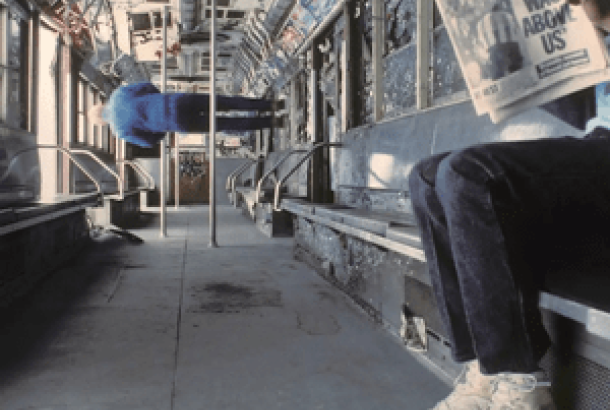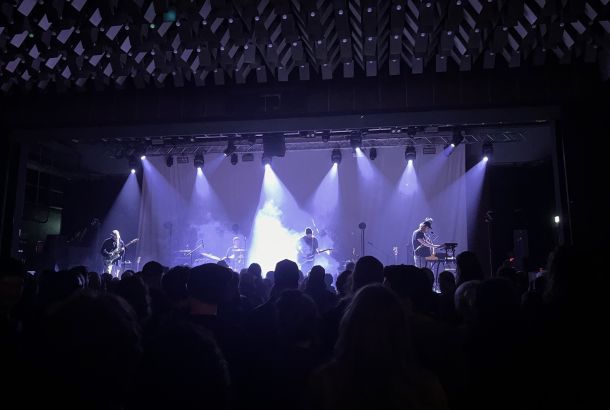
Following the release of their new single, Jay Plent cosied up with the Husky Loops lads Danio, Pietro and Tomasso in the elegant bunkbeds of the Deaf Institute’s surprisingly well-furnished backstage area. They talked art, touring with Placebo, music’s trajectory, and exactly who loves Superorganism the most (spoiler: it was a three-way tie).
Your main logo is an incomplete circle; do you ever get any people with OCD telling you how infuriating that is?
D: It’s me!
(All laugh)
D: So he (points at Pietro) made it, and I am infuriated cos I’m so OCD. I think Pietro enjoys annoying me.
P: People consider visual things as stuff that’s meant to be pretty. So if you’re looking at it with an urge to fix it then that’s good really.
Let’s talk about image because there’s a real minimalism to your artwork, your stage attire etc, which doesn’t necessarily reflect how varied and colourful your music is. Was that a deliberate contrast or a purely cosmetic choice?
D: It’s totally connected to the music, to the space of the music, it’s like with what actors do, dress in black. Underlining moments of the show, which is the point.
T: It matches some of the vibes our music expresses…
D: It’s a standard, it doesn’t say something, it’s just there, makes the music appear and the sound be more.
P: Let the content talk first, no distractions from the show. Black is like a canvas.
T: We talked this tour about wearing all white actually.
P: It really depends on the identity of the band. It’s not black with specific details or decorations…
T: …kind of elegant though.
P: We don’t wanna just look like, random. The minimalism is there to add a frame for everything that can happen in our music or visuals. We’re not narrowing it to a specific genre.
In a previous interview, you talk about using samples and bands using backing tracks live, what do you think is a step too far when it comes to using pre-recorded stuff live? What keeps your shows authentic in that regard?
D: I don’t think there’s a right or wrong way to do it — we want to do everything live. In our show now, everything you see and hear is made on stage. There’s a massive risk of fucking up, but that just adds to the show. I hear every mistake, but if I was in the crowd, I’d see something was happening in a different way, and making its own way, which is what live shows are about.
P: One thing we learned early on with the SPD (drum-pad), which is how we play all the samples, is that the possibilities are limitless — it’s too much. You can very quickly alter the sound of a band — bam, there’s an orchestra… you can go into something really fake really quickly. If you narrow the usage of the machine, you get something unique. You need to control the machine not let the machine control you…
D: …Pink Floyd said that in 1971, and I think it hasn’t changed.
You’ve recently released a new single, the excellent ‘When I Come Home.’ It’s a bit of a departure from your more aggressive stuff, and perhaps more sophisticated too, is it a sound you’re going to pursue in future material?
T: It’s one side of what we do. D writes a lot of stuff, different material that goes from harder stuff to more emotional, more intimate stuff. We always try to bring that side into the band. It shows we can work on more intimate stuff.
D: We wanted to show people we can write a pop song, as well.
P: We listened to a lot of RnB and contemporary music this year, and we started trying to make music that’s both in your face and gentle at the same time. Coming from a rock background, we associate intimacy with being slow and quiet, but it doesn’t need to be that way. You can have a fast hi-hat close, in your face, but have it still feeling intimate.
T: Or a massive kick, bass… and it still feels intimate.
P: We discovered we can do many things…
And with so much variety in your music, what do you feel is a common thread connecting it all together? Is it thematic, musical…?
D: Us three really, the process.
P: I think it’s care.
T: Attention to detail yeah…
P: We work on every sound and decision after hours of arguing with each other.
D: The spontaneous nature of this band is definitely what you catch live, but in the studio, we’re much more precise, more about the craft.
You’ve played alongside The Kills, Spoon, Placebo, and many others. Are there any tricks you’ve picked up from watching/touring/partying with them?
T: You learn something with everyone you tour with really. Alison (Mosshart, The Kills) has got an amazing stage presence.
P: It’s not just the way she looks or moves, it’s the way she owns the stage, all eyes are on her.
T: Spoon is an incredible band, and just the nicest guys to tour with. Placebo were just a lesson in touring huge. They’re huge.
P: Having a massive team taking care of the show is crazy too.
D: It was awesome on Placebo’s tour, but then it came to our own tour, like, we got used to the stuff like hearing everything on your monitors, having your own engineer…
P: If you’re not a touring musician you don’t realise that the people hear something different to what you hear on stage. On a big tour you have a dedicated sound tech, and it’s the perfect way to make you feel comfortable. Compare that to playing in a small pub with a sound engineer who can’t be bothered…
T: I love it though, I think I prefer the pub! It makes you feel much closer to reality.
D: It was great to do both things though, going up and down. With Superfood we had like, a gig in a small pub in Nottingham, then played a 3,000-seat arena the next day.
With Husky Loops, there’s a great blend of genres in your writing. There are always rumblings in the media about the relevancy of guitar music in modern music. What do you think is gonna keep guitar music and your own music enticing and relevant?
D: What we consider rock music is definitely dead. It’s a matter of timeless songs. Like, I think Rachmaninoff No.3 is one of the most contemporary things you can hear today, because the way the music describes life is gonna stick with everyone for the rest of time.
With bands, they’ve gotta be creating a sound, more than just a ‘band statement.’ The whole basic drums, bass and guitar thing is gone, because nobody can do it anymore because everyone can do it now. Rock music innovated my life, Led Zeppelin and stuff changed my life, I don’t think rock music is doing that now, it’s just repeating.
How do you feel about the rumours of Gibson’s bankruptcy, about that potentially lost historic company?
D: I mean anything shutting down is sad, but I mean it’s just the way that…
P: Don’t justify capitalism man.
(All laugh)
D: Young people, everyone’s got a laptop or phone in their hands, they can make music anytime.
P: I mean look at Kodak a few years ago. Biggest fucking producer of film in the world. A few years later, it’s picked up again, companies restarted. What we define as music has changed. I think a reason for rock music being dead is that the instrumentation of the working classes is different now. If you’re a kid now you have a tablet, a PC, to make music, not instruments.
T: It all goes in cycles, like 20 years ago vinyls got chucked in the bin, and now they’re more popular than ever.
D: Bands have been doing stuff that’s been happening before, and that shouldn’t be the point. If you concentrate on how to communicate what you want to communicate, that’s what’s important. I mean the White Stripes did something different with similar elements.
P: If rock music is meant to be non-conformative, bringing something new to the table, then rock music will stay alive. If it keeps fitting a repetitive template, it will die.
T: All the people we remember from rock music are the ones that did something fresh. I was reading reviews from NME and Melody Maker from 1968 about Beatles albums — some of them are really bad! They hated the albums! The press at any time is always harsher.
Because, to our readers anyway, you’re a newish band, I thought I’d throw a couple of comparisons at you, and you can just throw ‘em right back with what you think, your gut reactions, first up: Death From Above?
D: We’re nothing like that band
T: Good bass player!
A Manchester local, Everything Everything?
D: We’re nothing like that band. I guess you could compare stuff but we’re nothing like ‘em really.
Superorganism?
P: We fucking love Superorganism.
T: Amazing band.
D: Unfortunately, we’re not as good as them. I don’t think we have much in common musically, but I really respect their project, it’s clever on so many levels, so new.
T: (Superorganism) are so good, they’re what pop music needs right now.
P: They’re opening up the internationalism of our generation — pop tracks that are instant classics, and at the same time so relevant. So much respect!
Coldplay? EARLY Coldplay, I should specify…
D: People associate us with Coldplay? Ok. ‘Yellow’ and ‘Fix You’ are incredible songs. But recently… I don’t know Chris (Martin) but I don’t think Chris gives a shit anymore, sorry Chris.
Any surprises in store for tonight?
P: We have a whole new set…
D: Tom’s gonna get naked…
T: You can’t say that in an interview man…(Laughs)
D: I so wish you’d do that…
P: He’s got a massive dick…
D: This is our very Italian sense of humour… (Laughs)
Are there places on the tour you’ve never played, and where are you most excited to play besides Manchester?
T: Glasgow, but also we’re headlining here (Deaf Institute) for the first time.
D: I’ve heard good things about the art school in Glasgow, so we’re excited to play there, but I’d say we’re the same level of excited as we are for everywhere on this tour.
Husky Loops are on tour now. Check them out at your nearest convenience, and listen to their newest single ‘When I Come Home’ on Spotify.







